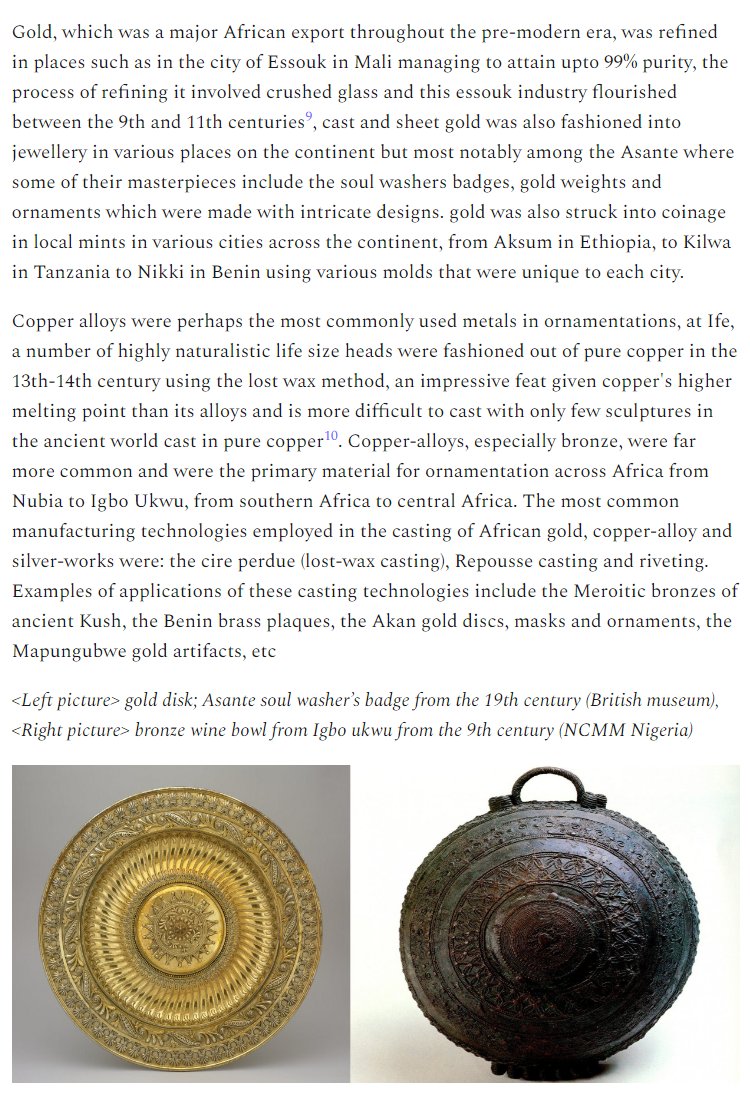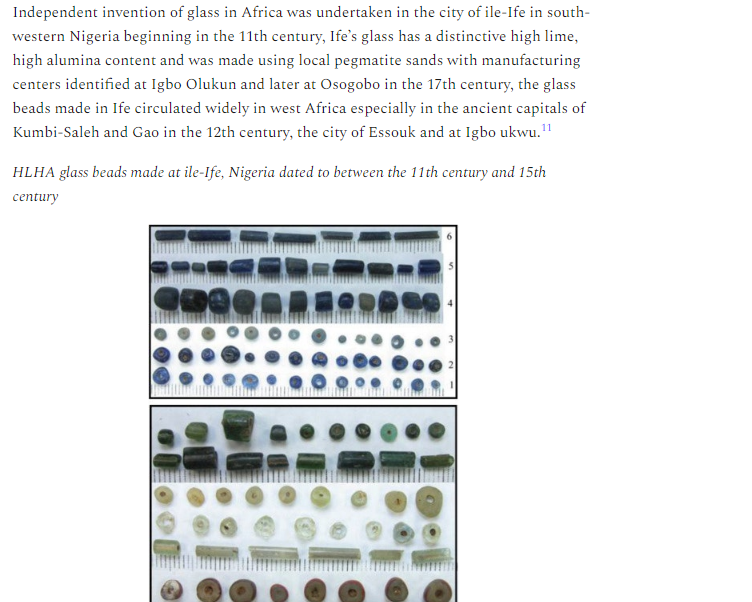My article:
"Science and technology in African history; Astronomy, Mathematics, Medicine and Metallurgy in pre-colonial Africa"
included; African scientific manuscripts, engineering feats in transport, and the world's astronomical observatory building
isaacsamuel.substack.com/p/science-and-…

"Science and technology in African history; Astronomy, Mathematics, Medicine and Metallurgy in pre-colonial Africa"
included; African scientific manuscripts, engineering feats in transport, and the world's astronomical observatory building
isaacsamuel.substack.com/p/science-and-…


"African metallurgy begun in the third millennium BC and the early 1st millennium BC for both copper-alloys and iron
high quality iron made by the Swahili in Mombasa (Kenya) was exported to south India as reported by al-Idrisi in the 12th century"
isaacsamuel.substack.com/p/science-and-…
high quality iron made by the Swahili in Mombasa (Kenya) was exported to south India as reported by al-Idrisi in the 12th century"
isaacsamuel.substack.com/p/science-and-…

"gold was refined in the old city of essouk in mali upto 99% purity
ife artists fashioned naturalistic sculptures using pure copper
across the continent, African artists used lost-wax casting, repousse and riveting to make sophisticated artworks"
isaacsamuel.substack.com/p/science-and-…
ife artists fashioned naturalistic sculptures using pure copper
across the continent, African artists used lost-wax casting, repousse and riveting to make sophisticated artworks"
isaacsamuel.substack.com/p/science-and-…

"glass was independently invented in the city of Ife in Nigeria
glass manufacture was undertaken in the kingdoms of Kush, Makuria and Aksum; where raw glass was found
glass was reworked across Africa"
<inset>
Meroitic and Aksumite glass vessels
isaacsamuel.substack.com/p/science-and-…

glass manufacture was undertaken in the kingdoms of Kush, Makuria and Aksum; where raw glass was found
glass was reworked across Africa"
<inset>
Meroitic and Aksumite glass vessels
isaacsamuel.substack.com/p/science-and-…


"African states used various forms of intensive farming systems to increase agricultural production
these included mechanical water-lifting, ox-drawn plows dry-stone terracing and many forms of irrigation"
cc: "Science and technology in African history"
isaacsamuel.substack.com/p/science-and-…
these included mechanical water-lifting, ox-drawn plows dry-stone terracing and many forms of irrigation"
cc: "Science and technology in African history"
isaacsamuel.substack.com/p/science-and-…
"inorder to utilize confined urban spaces African architects innovated a number of architectural designs using sandstone, coralstone and mudbrick to raise multistory structures and house more people,
also using domes and vaults to maximize interior spaces"
isaacsamuel.substack.com/p/science-and-…
also using domes and vaults to maximize interior spaces"
isaacsamuel.substack.com/p/science-and-…

"There were a number of African innovations in overland and maritime transportation
including shipbuilding for vessels that sailed as far as south asia
extensive paved road networks in the kingdoms of Asante and Aksum and bridges in gondarine ethiopia"
isaacsamuel.substack.com/p/science-and-…
including shipbuilding for vessels that sailed as far as south asia
extensive paved road networks in the kingdoms of Asante and Aksum and bridges in gondarine ethiopia"
isaacsamuel.substack.com/p/science-and-…
one of the best attested applications of mathematics in ancient African construction is an engraving of a pyramid at Meroe
drawn in 40BC, it depicts 48 horizontal lines each 5.25cm apart and two diagonal lines rising at 72° all using the 8:5 golden ratio
isaacsamuel.substack.com/p/science-and-…
drawn in 40BC, it depicts 48 horizontal lines each 5.25cm apart and two diagonal lines rising at 72° all using the 8:5 golden ratio
isaacsamuel.substack.com/p/science-and-…

"Don't give up, for that is ignorance and not according to the rules of this art. Those who know the arts of war cant imagine the agony and pain of a practitioner of this honorable science"
Mathematician al-kishnawi to his math students in nigeria in 1732
isaacsamuel.substack.com/p/science-and-…
Mathematician al-kishnawi to his math students in nigeria in 1732
isaacsamuel.substack.com/p/science-and-…
the city of Meroe in Sudan possessed the world's oldest astronomical observatory: a building complex with quadratic equations and engravings of figures operating astronomical instruments
it predates the Cheomseongdae observatory in Korea by 700 years
isaacsamuel.substack.com/p/science-and-…
it predates the Cheomseongdae observatory in Korea by 700 years
isaacsamuel.substack.com/p/science-and-…

"Astronomical manuscripts written in Gao, Djenne, Timbuktu and Lamu include illustrations of planetary orbits, the solar system and other details
Astronomy was taught in african schools to make more accurate calendars, guide caravans and seafarers, etc"
isaacsamuel.substack.com/p/science-and-…
Astronomy was taught in african schools to make more accurate calendars, guide caravans and seafarers, etc"
isaacsamuel.substack.com/p/science-and-…
in 1874 in bunyoro kingdom in western uganda, a british medical student observed and recorded a local surgeon perform a caesarean section with a team of assistants, both the baby and its mother were healthy within a week
"science and technology in Africa"
isaacsamuel.substack.com/p/science-and-…
"science and technology in Africa"
isaacsamuel.substack.com/p/science-and-…

Dan Tafa; the 19th century sokoto philosopher, geographer and historian from Nigeria, wrote a fairly detailed book on the geography of west Africa, north Africa, Arabia, south India and the east African coast
its titled: ‘Qataif al-jinan’
isaacsamuel.substack.com/p/science-and-…
its titled: ‘Qataif al-jinan’
isaacsamuel.substack.com/p/science-and-…
tagging @EdwardTufte and @VoulaSaridakis on the ancient observatory building in Meroe, Sudan
sanitation in African cities: indoor toilets and bathrooms
in the cities of Dongola (Sudan), Aksum (Ethiopia), Shanga and Gedi (kenya), Kumbi saleh (Mauritania), jenne-jeno, Timbuktu and Gao (Mali) and Kumasi (Ghana)
isaacsamuel.substack.com/p/science-and-…
in the cities of Dongola (Sudan), Aksum (Ethiopia), Shanga and Gedi (kenya), Kumbi saleh (Mauritania), jenne-jeno, Timbuktu and Gao (Mali) and Kumasi (Ghana)
isaacsamuel.substack.com/p/science-and-…

• • •
Missing some Tweet in this thread? You can try to
force a refresh




